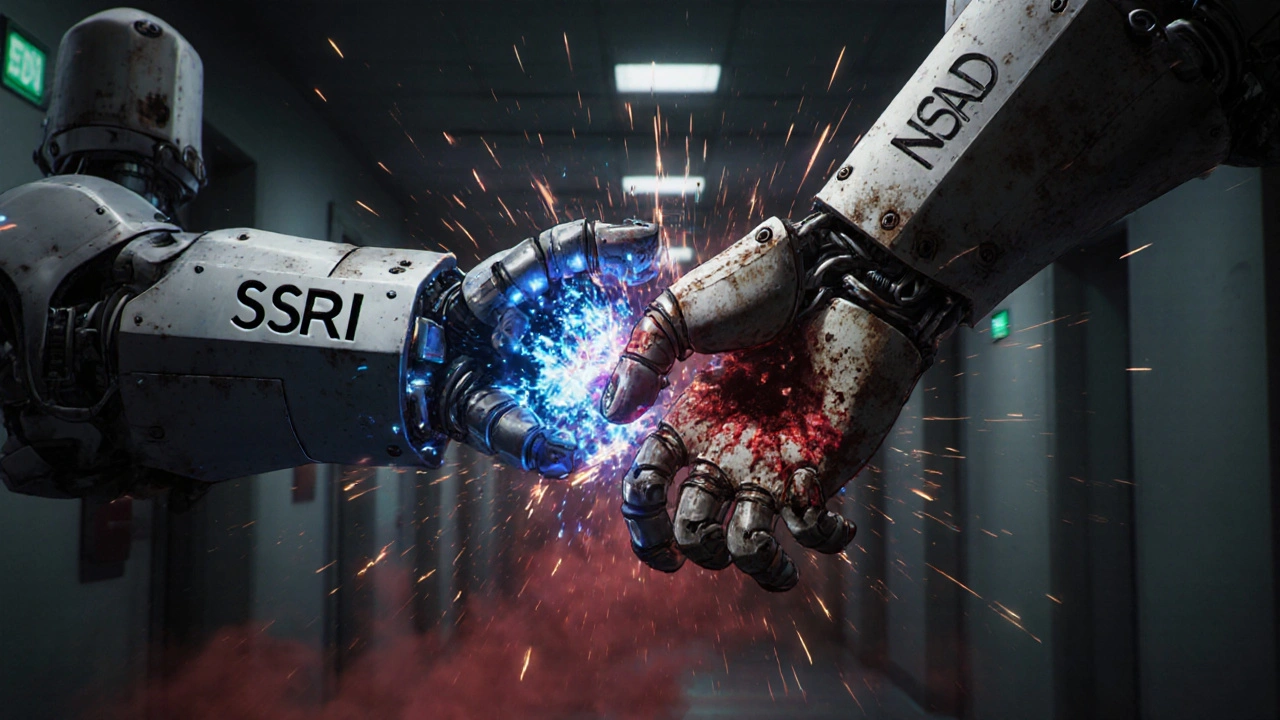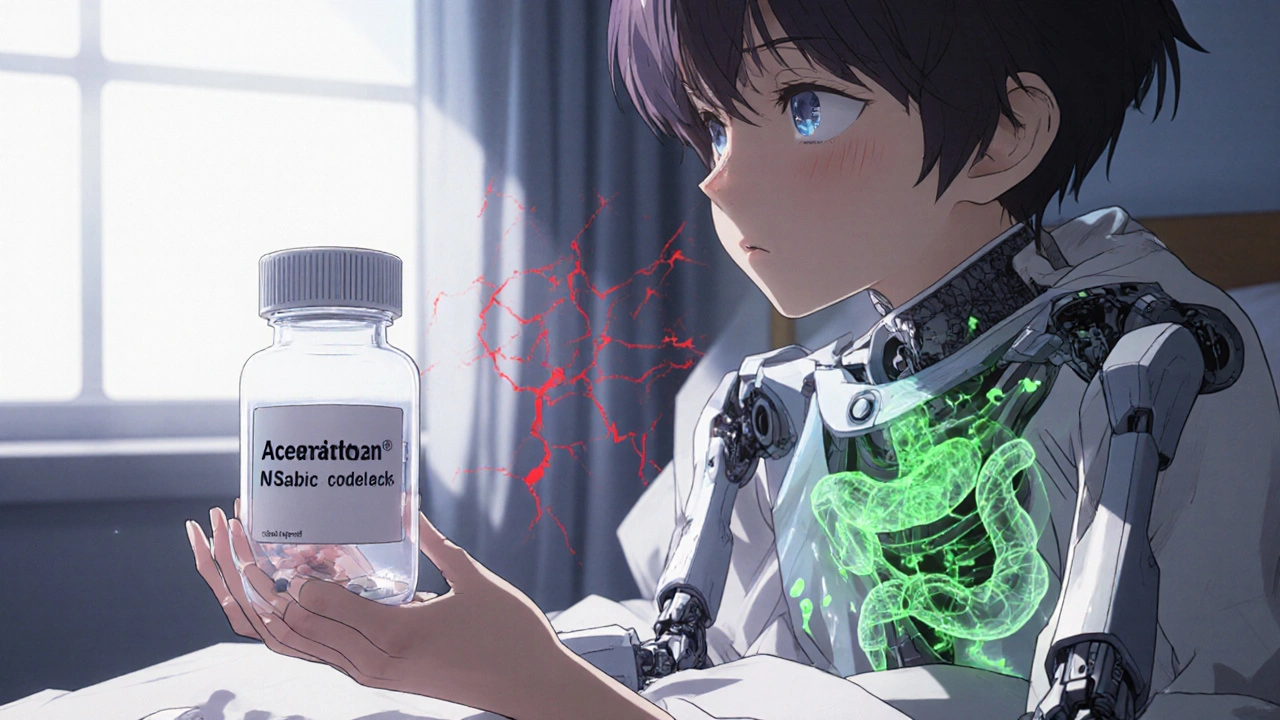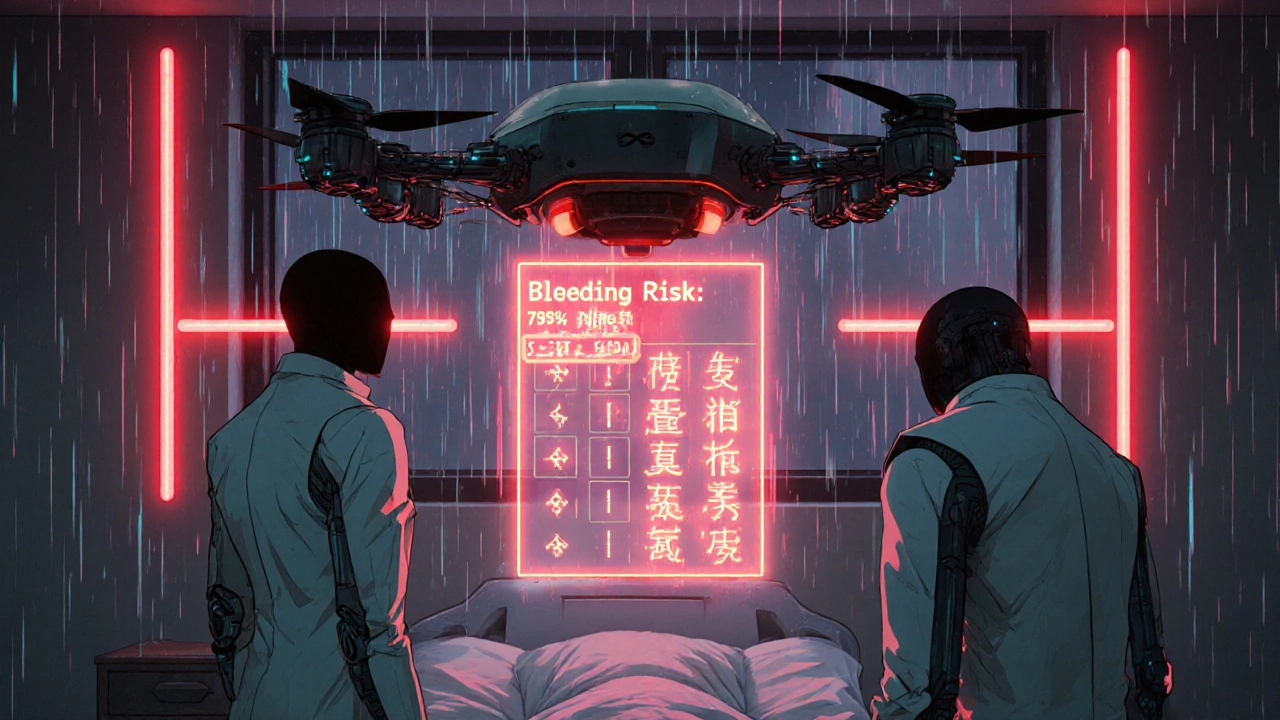 Nov, 17 2025
Nov, 17 2025
SSRI-NSAID Bleeding Risk Calculator
Calculate Your Personalized Risk
Enter your details to estimate your risk of gastrointestinal bleeding when combining SSRIs and NSAIDs.
Combining SSRIs and NSAIDs might seem harmless-after all, millions of people take antidepressants for depression and NSAIDs for back pain or arthritis. But here’s the hard truth: SSRIs with NSAIDs can dramatically raise your risk of a life-threatening stomach bleed, and most people don’t know it.
Let’s break it down simply. SSRIs like sertraline, fluoxetine, and escitalopram help lift your mood by boosting serotonin in your brain. But serotonin isn’t just a mood chemical-it’s also critical for blood clotting. When SSRIs block serotonin reuptake in platelets, those cells can’t stick together properly to stop bleeding. Meanwhile, NSAIDs like ibuprofen, naproxen, or diclofenac eat away at your stomach lining by reducing protective prostaglandins. Put them together, and you’ve got a one-two punch: your blood can’t clot, and your stomach is already damaged.
Studies show this combo increases your risk of upper GI bleeding by 75% compared to taking NSAIDs alone. That’s not a small bump-it’s a massive jump. One 2022 meta-analysis of over 1.2 million patients confirmed this across every major study. And it’s not just theoretical. Real people are ending up in emergency rooms because their doctors never warned them.
Why This Risk Is So High (And Why It’s Often Overlooked)
The danger isn’t just from one drug-it’s from how they work together. SSRIs alone raise bleeding risk by 1.5 to 2 times. NSAIDs alone? That’s 2 to 4 times higher. But together? It’s not 2 + 4 = 6. It’s multiplicative. Think of it like two leaks in a boat: each alone might drip slowly, but together, they sink you fast.
Age makes it worse. If you’re over 65, your stomach lining is thinner, your kidneys process drugs slower, and your platelets are already less responsive. Add in a history of ulcers, kidney disease, or other meds like blood thinners, and your risk skyrockets. One 2002 JAMA study found that older adults on both SSRIs and NSAIDs had more than a 12-fold increase in bleeding compared to people taking neither.
And here’s the kicker: many doctors don’t ask about OTC meds. A patient might say, “I’m on Zoloft,” but never mention they’re popping Advil every day for their knees. Meanwhile, pharmacists don’t always flag the interaction because it’s not on the most obvious warning lists. Patients? They assume if a drug is sold over the counter, it’s safe with everything else.
Not All NSAIDs Are Created Equal
If you need pain relief while on an SSRI, not all NSAIDs are equally risky. Some are worse than others.
- Naproxen and diclofenac carry the highest GI bleeding risk among non-selective NSAIDs.
- Ibuprofen is slightly less risky-but still dangerous when combined with SSRIs.
- Celecoxib (Celebrex), a COX-2 inhibitor, has significantly lower bleeding risk. One study showed it’s about half as risky as traditional NSAIDs.
But even celecoxib isn’t risk-free. And if you’re on long-term NSAIDs for arthritis, you’re still stacking the odds against yourself.
Here’s what the data says: if you’re on an SSRI and need pain relief, the safest bet isn’t a different NSAID-it’s switching to acetaminophen (paracetamol). Unlike NSAIDs, acetaminophen doesn’t hurt your stomach lining or interfere with platelets. A 2023 review of over a million patients confirmed: no increased bleeding risk when SSRIs are paired with acetaminophen.
What About Proton Pump Inhibitors (PPIs)?
Many doctors will tell you to just take a PPI like omeprazole or pantoprazole along with your NSAID and SSRI. And yes, that helps.
Studies show PPIs cut the absolute risk of bleeding by about 70%. If your baseline risk without protection is 1.5% per year, adding a PPI drops it to around 0.5%. That’s a big win.
But here’s the problem: PPIs aren’t harmless either. Long-term use can lead to nutrient deficiencies (magnesium, B12), increased risk of bone fractures, and even kidney issues. They’re a band-aid, not a solution. And they don’t fix the platelet problem caused by SSRIs-only the stomach lining damage.
So while PPIs are recommended for high-risk patients (over 65, prior ulcers, on multiple bleeding-risk drugs), they shouldn’t be the default answer for everyone. The real goal is to avoid the combo altogether when possible.

Real Stories: What Patients Are Saying
On patient forums, the stories are chilling.
A 68-year-old woman in Ohio was on sertraline for anxiety and ibuprofen for arthritis. She started feeling dizzy and weak. Her doctor thought it was the flu. Three days later, she collapsed at home with black, tarry stools. She ended up in the ER needing three units of blood. No one had told her the meds could cause this.
Another man on fluoxetine and naproxen for chronic back pain developed vomiting with blood. His GI specialist told him: “This is textbook SSRI-NSAID interaction. You’re lucky you didn’t bleed out.”
On Drugs.com, nearly 30% of users who took both drugs reported GI side effects. Over 12% said they had actual bleeding episodes. And most admitted: “No one warned me.”
On Reddit’s r/antidepressants, over 140 threads since 2020 are dedicated to this exact issue. Sixty-eight percent of posters said they only learned about the risk after they got sick.
What Should You Do? A Clear Action Plan
If you’re on an SSRI and taking NSAIDs, here’s what to do-right now:
- Stop taking NSAIDs unless absolutely necessary. If you’re using them daily for pain, ask your doctor if you really need them.
- Switch to acetaminophen. For headaches, muscle aches, or joint pain, acetaminophen (up to 3,000 mg/day) is your safest bet. No bleeding risk with SSRIs.
- If you must keep an NSAID, pick the lowest effective dose for the shortest time. Avoid naproxen and diclofenac. Ibuprofen is better, celecoxib is best-but still risky.
- Ask for a PPI if you’re over 65, have a history of ulcers, or are on other blood thinners. Omeprazole 20 mg daily is standard. Don’t skip this if you’re high-risk.
- Ask your doctor about alternatives to SSRIs. Vortioxetine and some SNRIs like venlafaxine have lower bleeding risk than fluoxetine or paroxetine. Talk to your prescriber if you’re concerned.
- Watch for warning signs. Black or tarry stools, vomiting blood, sudden dizziness, or unexplained fatigue could mean internal bleeding. Go to the ER-don’t wait.

The Bigger Picture: Why This Is a Public Health Problem
In the U.S., over 264 million SSRI prescriptions and 70 million NSAID prescriptions are filled every year. Even if only 10% of those are combined, that’s millions of people at risk.
The FDA started requiring warning labels on SSRIs in 2019. The European Medicines Agency followed with similar guidance in 2021. But warnings on a pill bottle don’t change behavior. A 2020 study found that over 28% of primary care patients were still being prescribed both drugs together-despite the known risk.
Health systems are starting to catch up. Some EHRs now trigger alerts when a doctor tries to prescribe an SSRI and NSAID together. One study showed those alerts cut dangerous combinations by 32%.
Still, the burden is huge. In 2022, SSRI-NSAID bleeding events cost the U.S. healthcare system over $1.2 billion-mostly from hospital stays and ER visits. That’s money spent because we didn’t educate patients and providers.
What’s Next? The Future of Safer Treatment
Research is moving fast. New antidepressants like vortioxetine and lumateperone are being tested specifically for lower bleeding risk. Early data shows vortioxetine causes 40% fewer bleeding events than traditional SSRIs.
Genetic testing is also coming into play. Some people have a CYP2C19 gene variant that makes them poor metabolizers of certain SSRIs. That means higher drug levels in the blood-and higher bleeding risk. Soon, doctors may test for this before prescribing.
By 2030, experts predict a 60% drop in inappropriate SSRI-NSAID combinations thanks to better EHR alerts, patient education, and safer alternatives.
But you don’t have to wait for that future. Right now, you can protect yourself.
Don’t assume your doctor knows. Don’t assume OTC means safe. Ask the questions. Demand clarity. Your stomach-and your life-depend on it.
Can I take ibuprofen with sertraline?
Taking ibuprofen with sertraline increases your risk of gastrointestinal bleeding by about 75% compared to using ibuprofen alone. While ibuprofen is less risky than naproxen or diclofenac, it still interferes with stomach protection and platelet function. If you need pain relief, switch to acetaminophen instead. If you must use ibuprofen, use the lowest dose for the shortest time and ask your doctor about a proton pump inhibitor (PPI) like omeprazole.
Is it safe to take aspirin with SSRIs?
No, combining aspirin with SSRIs is especially dangerous. Aspirin is a blood thinner that also damages the stomach lining. When added to an SSRI, it creates a triple threat: reduced clotting, weakened stomach lining, and impaired healing. Studies show this combo increases bleeding risk by more than 12-fold compared to not taking either. If you’re on an SSRI and need heart protection, talk to your doctor about alternatives like low-dose clopidogrel-but only if absolutely necessary.
Do all SSRIs carry the same bleeding risk?
No. SSRIs vary in how strongly they block serotonin reuptake in platelets. Paroxetine and fluoxetine have the strongest effect and are linked to higher bleeding risk. Sertraline and citalopram have a weaker effect and may be slightly safer-but still risky when combined with NSAIDs. If you’re on a high-risk SSRI and need NSAIDs, talk to your doctor about switching to vortioxetine, which shows lower bleeding rates in clinical trials.
What are the signs of a GI bleed from this drug combo?
Watch for black, tarry stools (melena), vomiting blood or material that looks like coffee grounds, sudden dizziness, rapid heartbeat, or unexplained fatigue. These aren’t normal side effects-they’re emergency signs. If you experience any of these while on an SSRI and NSAID, go to the ER immediately. Delaying care can be fatal.
Should I stop my SSRI if I need NSAIDs?
Never stop an SSRI abruptly-it can cause withdrawal symptoms or worsen depression. Instead, talk to your doctor about alternatives: switch your pain medication to acetaminophen, or switch your antidepressant to one with lower bleeding risk (like vortioxetine). If you absolutely need both, use a proton pump inhibitor and monitor closely. Your mental health matters, but so does your physical safety.
Alexis Paredes Gallego
November 19, 2025 AT 11:32Saket Sharma
November 19, 2025 AT 21:53Shravan Jain
November 21, 2025 AT 08:07Brandon Lowi
November 22, 2025 AT 13:44Joshua Casella
November 22, 2025 AT 21:10Richard Couron
November 23, 2025 AT 23:38Alex Boozan
November 24, 2025 AT 05:13mithun mohanta
November 24, 2025 AT 23:21